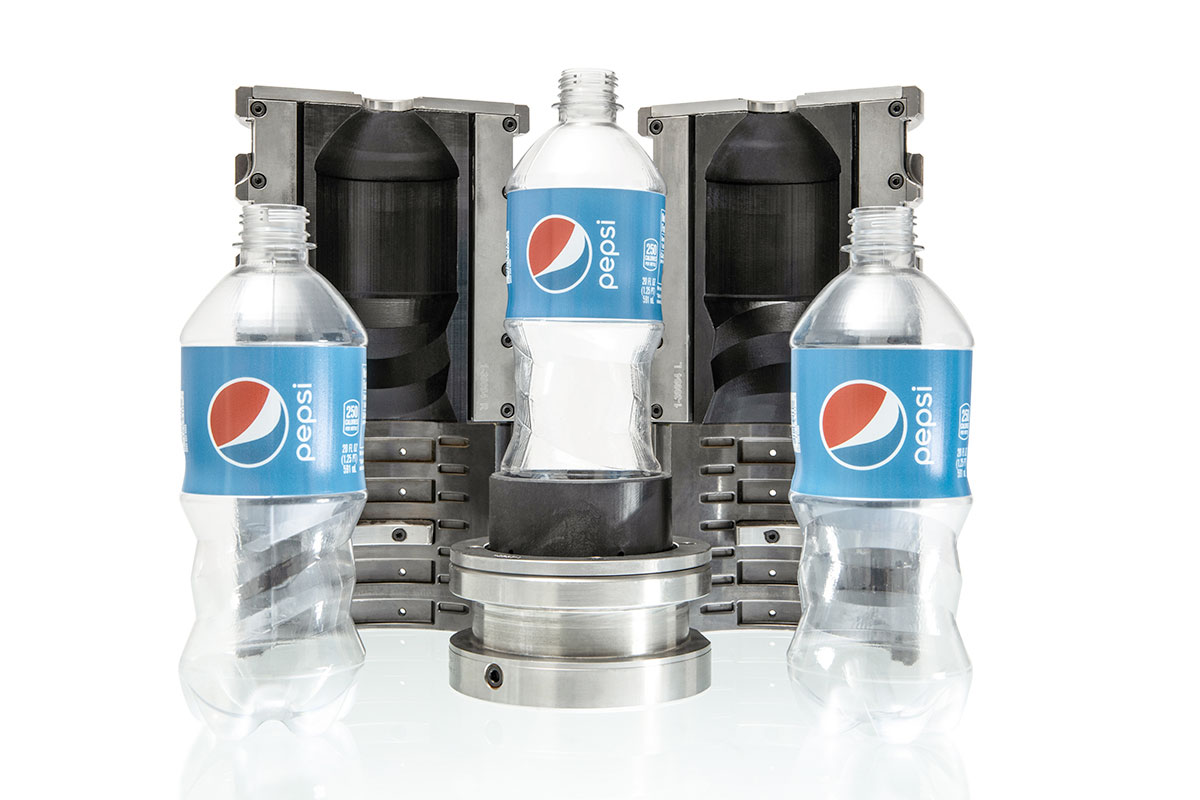PepsiCo worked with Nexa3D’s partner Dynamism to validate the NXE 400 and the xPEEK147 material as ideal for their blow molding application requiring speed and durability.
Background
PepsiCo products are enjoyed by consumers more than one billion times a day in more than 200 countries and territories around the world. PepsiCo generated more than $79 billion in net revenue in 2021, driven by a complementary beverage and convenient foods portfolio that includes Lay’s, Doritos, Cheetos, Gatorade, Pepsi-Cola, Mountain Dew, Quaker, and SodaStream. PepsiCo’s product portfolio includes a wide range of foods and beverages, including many iconic brands that generate more than $1 billion each in estimated annual retail sales.
Challenge
Speed to market has never been more important in the consumer goods sector, as brand owners aim to develop new bottle and package designs to address ever-shifting customer desires. But creating conventional metal tooling for the blow molding of bottles is an expensive and time-consuming proposition. Once a CAD file of the package design is created, it can take up to four weeks to machine a metal tool, and then an additional two weeks to get a trial unit to do the actual blow molding. It also could easily cost up to $10,000 to produce a single metal tool set depending on its complexity, according to Max Rodriguez, senior manager of Global Packaging R&D, Advanced Engineering and Design, at PepsiCo’s Valhalla research center.
This has led many to try to apply 3D printing to shorten this process, but previous rapid tooling approaches also had their shortcomings. It would take two to three days to 3D print a single blow molding tool from Digital ABS (an expensive material) on a $250,000 PolyJet 3D printing machine. Even so, the resulting tool lacked durability and could produce only about 100 bottles before the mold began to fail. This prompted Rodriguez and his team to explore using a hybrid approach, combining parts of a conventional metal mold with 3D printed inserts.
Solution
This hybrid model –– which PepsiCo patented in late 2020 –– involves using a universal metal outer mold shell that fits into most commercial blow molding machines today. PepsiCo then explored using additive manufacturing to print only the essential internal parts of the mold that yield the final product’s geometry. Working with Dynamism introduced the PepsiCo team to industrial solutions in 3D printing that could meet their requirements.
PepsiCo chose Nexa3D’s xPEEK147 from Henkel Loctite for the 3D printed tool inserts due to the material’s strength and impressive performance factors, including its very high heat-deflection temperature. While this hybrid approach is machine-agnostic, meaning it can use various types of 3D printers, PepsiCo has found the ultrafast, high-throughput Nexa3D NXE 400 printer and accompanying material performance to be ideal for producing the mold components it needs. A complete mold set can be made in 12 hours, with 8 hours of 3D printing time and 4 hours of curing. These hybrid-made molds can then successfully be used for more than 10,000 bottles before failure – at up to a 96% reduction of cost compared to traditional metal tooling.
The team applied a backing of dental stone to the printed inserts to give the mold cavities the compressive strength needed for blow molding up to 40 bar pressure. It then used a modified, lab-scale BLOWscan stretch blow molding machine from Northern Ireland-based Blow Moulding Technologies (BMT) to produce the actual bottles. BMT has been a strategic service provider and a trusted partner to PepsiCo for the past five years, noted Rodriguez.
PepsiCo took delivery in Valhalla of the reengineered BLOWscan, lab-scale stretch blow molding machine early this year, he said, and has been producing bottles on a daily basis using its hybrid tooling approach for the past few months.
“Time and cost are obviously important,” Rodriguez acknowledges. “But more important is to have the ability to have the flexibility to run through a number of different design iterations at a record pace so that we can evaluate performance in all of the downstream activities. That really is what helps us to accelerate.”
These downstream activities include confirming how the bottle performs on PepsiCo’s packaging lines, vending machines, and its distribution network.
This approach “also facilitates our capability of validating our virtual tools because we are now able to pair them up with physical results,”he added.
This assists PepsiCo in its material characterization work, performance analysis, and physical testing.
“Through the use of these capabilities,” Rodriguez says, “we expect
our development cycle to improve by 30 percent.”
A complete mold set can be made in 12 hours, with 8 hours of 3D printing time and 4 hours of curing. These hybrid-made molds can then successfully be used for more than 10,000 bottles before failure – at up to a 96% reduction of cost compared to traditional metal tooling.
Subscribe to our Newsletter
3DPresso is a weekly newsletter that links to the most exciting global stories from the 3D printing and additive manufacturing industry.





















